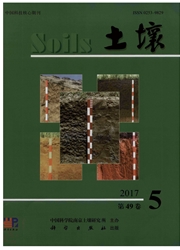

 中文摘要:
中文摘要:
采用厌氧热解方法制备污泥生物质炭和花生秸秆炭,研究了钢渣和生物质炭单独施用及配合施用对红壤酸度的改良效果,结果表明,钢渣、花生秸秆炭和污泥生物质炭均含有一定量的碱性物质,向红壤中添加钢渣和生物质炭可以中和土壤酸度,提高土壤pH,增加土壤交换性盐基阳离子含量,降低土壤交换性铝含量。90天培养实验结束时,这3种改良剂分别使土壤pH相对对照提高1.10、O.72和0.48。钢渣与花生秸秆炭配合施用对土壤酸度的改良效果最好,使土壤pH相对对照提高2.14,单施污泥生物质炭的改良效果最小。钢渣和生物质炭含一定量的养分元素,添加钢渣和生物质炭可以同时改善土壤肥力。钢渣含丰富的钙,添加钢渣使土壤交换性钙含量增幅最大,相对对照增加4.5倍;添加花生秸秆炭使土壤交换钾增加最显著,相对对照约增加7倍;污泥生物质炭含丰富的磷,添加污泥生物质炭使土壤有效磷增加最显著,相对对照增加5.4倍。添加钢渣和2种生物质炭均显著提高了土壤交换性镁含量,将钢渣与生物质炭配合施用,土壤交换性镁含量的增幅更大。由于钢渣和2种生物质炭的碱含量和养分含量各有特点,因此可以根据土壤酸度状况和养分含量选择将钢渣与不同生物质炭配合施用,以达到既能最大限度中和土壤酸度又能补充土壤所必需养分的目的。
 英文摘要:
英文摘要:
Biochars were prepared from wastewater sludge and peanut straw using a pyrolysis method. Amelioration effects of the biochars, steel slag and steel slag combined with biochars on red soil acidity were investigated. Results indicated that steel slag and the biochars contained alkaline substances and incorporation of steel slag and biochars neutralized soil acidity, increased soil pH and soil exchangeable base cations and decreased soil exchangeable aluminum. At the end of 90d incubation, soil pH increased by 1.10, 0.72 and 0.48 units due to the incorporation of peanut straw char, steel slag and wastewater sludge char. Steel slag combined with peanut straw char had greatest ameliorating effect on soil acidity, and led to soil pH increased by 2.14 units, while the amelioration of the biochar generated from wastewater sludge on soil acidity was lowest. Steel slag and biochars contain some nutrients and addition of steel slag and biochar can improve soil fertility. Among the treatments of steel slag, peanut straw char, biochar from wastewater sludge, incorporation of steel slag obtained the greatest increase in soil exchangeable Ca^2+ due to the highest content of Ca in it, and soil exchangeable Ca^2+ was 4.5 fold higher than that of control. Incorporation of peanut straw char increased soil exchangeable K^+ greatly, and soil exchangeable K^+ was 7 folds higher than that of control. Incorporation of biochar from wastewater sludge led to greatest increase in soil available phosphorus due to the highest content of P in it and soil available phosphorus was 5.4 folds higher than that of control. Both slag and biochars increased soil exchangeable Mg^2+ significantly, and higher increase in soil exchangeable Mg^2+ was obtained by combination of steel slag with biochars. Therefore, incorporation of steel slag combined with biochars not only neutralized soil acidity, but also increased contents of some soil nutrients because of variation of steel slag and biochars in alkalinity and nutrient contents.
 同期刊论文项目
同期刊论文项目
 同项目期刊论文
同项目期刊论文
 期刊信息
期刊信息
